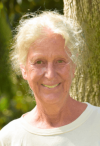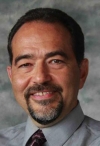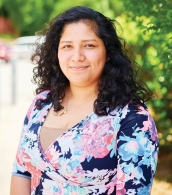Long COVID is impacting millions of people in the U.S. and worldwide, and information and data about the complex associated phenomena are still emerging. Long-COVID or post-COVID conditions cover a wide range of new, returning, or ongoing health problems that people experience following an infection with the virus that causes COVID-19. The impact on disenfranchised populations including immigrants, migrants, and refugees may be heightened due to pre-existing health inequities and structural racism both of which contribute to barriers to health care access for long COVID. This webinar will focus on COVID-19's long-term impact on physical and mental health as well as the implications for workers, relationships and family life. We will also address concerns for the future of refugee, immigrant and migrant communities with long COVID and recommendations for long COVID assessments and currently available treatments.
Watch the Webinar Recording
Download the Presentation Slides
Take the Evaluation
Presenters

Kaethe
Weingarten
Ph.D.
Director, Witness to Witness Program
Migrant Clinicians Network
Kaethe Weingarten, Ph.D. (she/her) directs the Witness to Witness (W2W) Program for MCN. The goal of W2W is to help the helpers, primarily serving health care workers, attorneys and journalists working with vulnerable populations. She received her doctorate from Harvard University in 1974. She has taught at Wellesley College (1975-1979), Harvard Medical School (1981-2017), where she was an Associate Clinical Professor of Psychology in the Department of Psychiatry at Children’s Hospital Boston and then Cambridge Health Alliance, and at the Family Institute of Cambridge (1982-2009). She founded and directed the Program in Families, Trauma and Resilience at the Family Institute of Cambridge. Internationally, she has taught in Africa, Australia, Canada, Europe and New Zealand, where she was a Fullbright Specialist. She has given over 300 presentations and been a keynote speaker at numerous local, national and international conferences. She serves on the editorial boards of five journals. In 2002 she was awarded the highest honor of the American Family Therapy Academy, the award for Distinguished Contribution to Family Theory and Practice. She has written about her work in six books (which she has authored or edited) and over 100 articles, chapters and essays. Her most recent book, Common Shock: Witnessing Violence Every Day- How We Are Harmed, How We Can Heal won the 2004 Nautilus Award for Social Change. Dr. Weingarten’s work focuses on the development and dissemination of a witnessing model. One prong of the work is about the effects of witnessing violence and trauma in the context of domestic, inter-ethnic, racial, political and other forms of conflict. The other prong of the witnessing work is in the context of healthcare, illness and disability. Her work on reasonable hope has been widely cited. In 2013, Dr. Weingarten and her husband moved to Berkeley, CA to be near their children and five grandchildren. There she resumed a dance and choreography practice she had let lapse for forty-five years. Since moving to Berkeley, she and her dance collaborator have been awarded five grants for their choreography with elder dancers applying a witnessing model in public spaces. In 2018 they performed at the Oakland Museum of California. In her spare time she enjoys hiking, baking and crocheting afghans.

Laszlo
Madaras
MD, MPH, FAAFP, SFHM
Chief Medical Officer
Migrant Clinicians Network
As the Chief Medical Officer for Migrant Clinicians Network, Dr. Madaras is responsible for the oversight of MCN clinical activities. He also serves as a subject matter expert for various topics in migrant and immigrant health including COVID-19 clinical education. Since the first weeks of the SARS-CoV-2 pandemic, Dr. Madaras treated thousands of patients sick enough to need hospitalization and sometimes intensive care. Over the last 30 years, in parts of Africa, Latin America, South America, the Pacific Islands, and the United States, Dr. Madaras has worked served thousands for wide ranging ailments, including newly emerging diseases such as Zika and most recently COVID-19. This interest began for him in the mid-1980s while serving as a Peace Corps Volunteer in the Congo where he learned to recognize schistosomiasis, onchocerciasis, filariasis, strongyloidiasis, and other tropical diseases, and witnessed the start of a newly detected virus soon to be named HIV.
Dr. Madaras spent his early childhood in Hungary and Sweden, arriving in the United States as refugee in 1968 at the age of seven and eventually became a US citizen. He graduated from Dartmouth College with a degree in biochemistry in 1983. He served three years in the Peace Corps in Congo (Zaire) as a regional fisheries coordinator, and then as a PC Country Desk Assistant for Ghana/Liberia/Sierra Leone in Washington, DC. He also worked as a pesticide review manager in the EPA in Washington, with several publications in the Federal Register regarding the removal of chemicals harmful to human health. Dr. Madaras received his MD and Masters in Public Health from Tufts University School of Medicine in 1993, and worked in Gabon, West Africa as an Albert Schweitzer Fellow in pediatrics. Later he worked with the American Refugee Committee on the Congo/Rwandan border during the 1994 Rwandan genocide. He also worked on the Hungarian border with the former Yugoslavia in 1995. Since 1996, Dr. Madaras has worked as a board-certified family physician in both inpatient and outpatient medicine in Pediatrics, Adult Medicine and Obstetrics. He served as a frontline clinician at the Keystone Health Center, a community health center, where he cared for farmworkers and their families and became Assistant Medical Director from 2001 to 2005. In 2005, he became a hospitalist in Chambersburg and Waynesboro Hospitals in south central Pennsylvania, where he continues to work part time. In 2016 he became a Senior Fellow of Hospital Medicine. In 2020, he became a Fellow of the American Academy of Family Physicians (FAAFP).
In addition, Dr. Madaras has worked as a staff physician in Tuberculosis control at the Pennsylvania State Health Department since 2012, and regularly teaches US-based medical students on an international health rotation in Honduras. Dr. Madaras also teaches hospital medicine to Penn State nurse practitioner and physician assistant students and medical residents at Summit Health. He is a Clinical Assistant Professor of Medicine at the Penn State College of Medicine as well as the Medical Director of Educational Affairs at WellSpan Summit Health. Dr. Madaras is married with two grown children. He enjoys language, travel, scuba diving, and hiking. He has been a nationally ranked age-group triathlete and completed several marathons and a dozen 50-mile ultra marathons.

Hannia was born in Tecun Umán, Guatemala and moved to Siler City, North Carolina with her family in 1998. In 2014 she earned a certificate as a Certified Nursing Assistant from Central Carolina Community College. Hannia joined the Hispanic Liaison’s Board of Directors in 2016 and served as Board President for over 3 years. She now leads the Hispanic Liaison’s new office in Sanford, NC, where she works to advance the rights of Hispanics at local and state levels. She also serves as the President for the Town of Siler City’s Immigrant Community Advisory Committee. Previously, Hannia worked as a bilingual COVID-19 Case Investigator for Carolina Community Tracing Collaborative, as the general manager for MJ’s Staffing Inc, and as a site manager for Community Management Corporation.
Continuing Education Credit (CEU)
To receive CME* or CNE credit after viewing this webinar, you must:
- Complete the Participant Evaluation associated with this webinar
- Send an email with your first and last name stating which webinar you completed to contedu@migrantclinician.org